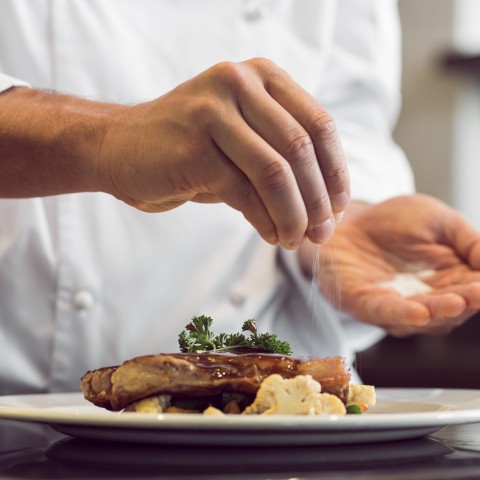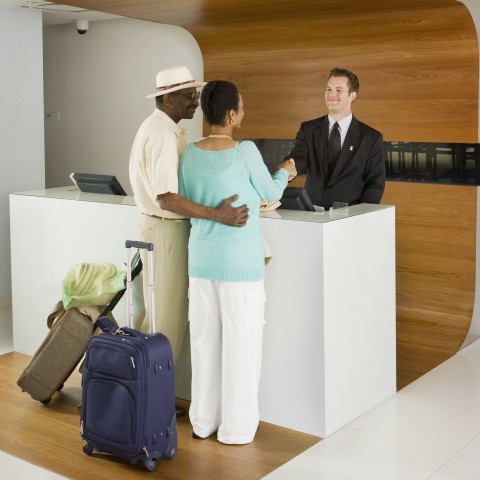When you’re traveling outside of your home country, there’s a very good chance that you won’t speak the language of that country. For that reason, it can be really helpful to learn some basic German travel phrases before going to Germany, Austria, or even parts of Switzerland, Belgium, and Luxemburg.
In this article, we’ll provide you with German phrases for tourists that will help you survive basic daily situations.
For instance, when traveling to the center of Europe, you’ll probably have to take a train at some point. (And if you don’t have to take one, we suggest you take one anyway. This experience is part of traveling to Germany.)
Once you’ve bought your ticket at Deutsche Bahn (the German railway company) and you’re ready to discover a new city, the conductor may want to see your ticket or ask some questions. If you didn’t know, even though this is an international company, their staff isn’t one-hundred percent trained to speak English. Trust us, you don’t want to come into this situation unprepared. You’ll need to know phrases for travelers in German.
But no worries. To prevent you from this embarrassing situation, we have free courses for beginner, intermediate, and advanced students. You can even find free bonus material on our website.
Without a lot of hustle and bustle, let’s just get straight to it. Here are the most useful German phrases for travelers.
Table of Contents
- Why Should You Learn German?
- German Pronunciation Specialities
- Greetings
- Basic Questions and Their Perfect Answers
- Restaurants and Ordering Food
- At the Hotel
- Locations and Transportation
- Working Through Communication Barriers
- How GermanPod101 Can Help You Master Urgent Travel Situations

1. Why Should You Learn German?
We know that learning another language can be frustrating and hard, and this may be more true of German than some other languages. But here are some facts that should convince you to learn German:
- Studying in Germany is free – While you have to pay for a college education in most countries, studying in Germany is free of charge.
- Germany is Export King – Germany is the country with the biggest export market in Europe, and the third biggest worldwide.
- Easy for native English speakers – English and German belong to the same language family, which makes it easy to learn (and vice versa).
- Startup hotspot – The startup scene is growing rapidly in the cities of Berlin, Munich, Cologne, and Hamburg.
Knowing even just the basic German travel phrases for beginners can greatly help you make the most of your time in Germany.
2. German Pronunciation Specialities
Before we move on to learning German phrases for travelers, you should have a little information on German pronunciation specialties.
As already mentioned, German is really close to the English language, which makes it easy for good English speakers to adapt to German. But there are some combinations that require special effort in terms of pronunciation. On the left, you see the letter combination; on the right, an English equivalent to that sound.
| ei | line |
| ie | lean |
| ö | Worm without the ‘r’ |
| ü | Tea with rounded lips |
| ä | get |
| eu / äu | boy |
| sch | shoe |
| sp | shp |
| st | sht |
| ß | boss |
| z | cats |
3. Greetings
Now, onto the most basic German words and phrases for travellers: Greetings. These are the most common German travel phrases, and always important to have at the ready.
- Hallo!
Hello! - Guten Morgen!
Good morning! - Guten Tag!
Good day! - Guten Abend.
Good evening! - Bitte.
Please. - Danke.
Thanks. / Thank you. - Tschüss.
Bye. - Auf Wiedersehen.
Goodbye. - Ich heiße …
My name is … - Ich bin in Deutschland für … Wochen.
I am in Germany for … weeks. - Ich komme aus …
I am from … - Wie geht’s?
How are you? - Mir geht es gut.
I am fine.
4. Basic Questions and Their Perfect Answers
To help you out with the pronunciation and some practice for these questions, you can find a free lesson on our website. Also feel free to click on the links in the chart; they’ll take you to relevant German vocabulary lists on our site to help you answer the questions yourself!
| Question | Answer |
|---|---|
| Wo ist die Toilette Where is the bathroom? |
Die Toilette ist neben der Küche. The toilet is next to the kitchen. |
| Wo kommst du her? Where are you from? |
Ich komme aus London, England. I am from London, England. |
| Wie geht es dir? How are you? |
Mir geht’s gut und dir? I am fine and you? |
| Wie alt bist du? How old are you? |
Ich bin 25 Jahre alt. I am 25 years old. |
| Wie ist dein Name? What’s your name? |
Mein Name ist … . Wie ist dein Name? My name is … and yours? |
| Wie lautet deine Telefonnumer? What’s your phone number? |
Meine Telefonnumer lautet: 555-555-555. My phone number is: 555-555-555. |
| Was hast du gesagt? What did you just say? |
Ich habe dich nicht verstanden. I didn’t understand you. |
| Wo arbeitest du? Where do you work? |
Ich arbeite bei … . I work at … |
| Was ist das? What is this? |
Das ist ein … . That is a … . |
| Was ist dein Lieblingsessen? What is your favorite food? |
Ich esse am liebsten Pizza. My favorite food is pizza. |
5. Restaurants and Ordering Food
- Einen Tisch für zwei/drei/vier Personen, bitte.
A table for two/three/four persons, please. - Wir haben eine Reservierung.
We have a reservation. - Die Speisekarte, bitte.
The menu, please. - Ich hätte gerne das Steak mit Pommes.
I would like the steak with fries. - Haben Sie ein veganes Gericht?
Do you have a vegan meal? - Können Sie etwas empfehlen?
Can you recommend something? - Noch ein Glas Wasser, bitte.
Another glass of water, please. - Getrennt oder zusammen?
Together or separately? - Guten Appetit.
Enjoy your meal. - Die Rechnung, bitte.
The check, please.
We have a complete vocabulary list for you, with words for the restaurant.
6. At the Hotel
- Wir haben eine Reservierung.
We have a reservation. - Haben Sie noch freie Zimmer?
Do you have free rooms available? - Wie viel kostet ein Zimmer pro Nacht?
How much is a room per night? - Ich möchte ein Zimmer reservieren.
I would like to reserve a room. - Ist das Frühstück inklusive?
Is the breakfast inclusive? - Zimmerservice.
Room service. - Um wie viel Uhr ist Check-Out?
At what time is the check out?
7. Locations and Transportation
1- Asking for and Giving Directions
| Entschuldigung, wo ist die Bank / der Supermarkt / das Stadtzentrum / die Tankstelle / der Bahnhof / der Flughafen? Excuse me, where is the bank / the supermarket / the city center / the gas station / the train station / the airport? |
Norden / Süden / Westen / Osten North / South / West / East |
| In welcher Richtung finde ich … ? In which direction can I find … ? |
Oben / Unten / Vorne / Hinten Upstairs / Downstairs / Forward / Backward |
| Ist es noch weit von hier? Is it still far from here? |
Sie müssen geradeaus laufen. You have to walk straight. |
| Kann ich dorthin zu Fuß laufen? Can I get there on foot? |
Sie müssen links / rechts abbiegen. You have to turn left / right. |
| Welche Straßenbahn, Metro oder Bus muss ich nehmen? Which underground or bus do I have to take? |
Zum Flughafen / Bahnhof, bitte. To the airport / train station, please. |
| Ist es in der Nähe von … ? Is it close to … ? |
Um die Ecke. Around the corner. |
| Wo ist der Ausgang / Eingang? Where is the exit / entrance? |
Halten Sie hier an, bitte. Stop here, please. |
2- Transportation
- Wo ist die Haltestelle?
Where is the station? - Wo kann ich eine Fahrkarte kaufen?
Where can I buy a ticket? - Fährt dieser Zug / Bus nach … ?
Is this train / bus going to … ? - Können Sie es mir auf der Karte zeigen?
Can you show me on the map? - Muss ich umsteigen?
Do I have to change?
Again, we’ve prepared for you a free vocabulary list with words that you can use when asking for directions and locations.
8. Working Through Communication Barriers
Just in case you don’t know what to say or you didn’t understand anything someone just said to you, here are some phrases that can get you out of this sticky situation:
- Sprechen Sie Englisch?
Do you speak English? - Können Sie das bitte nochmal wiederholen?
Could you please repeat that again? - Ich spreche kein Deutsch.
I don’t speak German. - Ich verstehe Sie nicht.
I don’t understand you. - Können Sie das bitte übersetzen?
Could you please translate this for me? - Hilfe!
Help!
Maybe you’re asking yourself if you can go to Germany without speaking any German. Sure you can, you can live there even without speaking the language.
Getting along as a tourist with just English will be more than easy for you. Everybody knows at least the basics of English. And as long as they can see that you’re patient, they’ll be patient with you.
9. How GermanPod101 Can Help You Master Urgent Travel Situations
In this article, we showed you the most helpful phrases that you can use on your travels. We covered some basic pronunciation specialities of the German language, greetings, numbers, situations in a restaurant and hotel, and asking for directions.
While you can survive traveling Germany with only English, Germans will be really grateful when they see that you’re trying to speak their language. We know that German is a hard language, but to see someone trying makes us happy.
This article was just the beginning; take a look at our free resources. But if you really want to get to it and become a good German speaker, then we can offer you a private teacher to help you learn based on your needs and goals with the German language.
Before you go, let us know in the comments how you feel about using the useful German travel phrases outlined in this article. Feel free to reach out with questions in the comments below, and know that the more you practice and use these essential German travel phrases, the easier it will become.





















